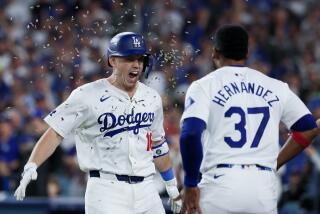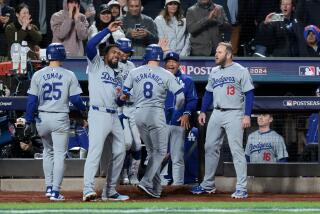BASEBALL : Saberhagen Seems Well-Suited to Change of Uniform, Location
PORT ST. LUCIE, Fla. — In moving from Kansas City to New York, from Main Street to Mean Street, Bret Saberhagen faces a major adjustment in lifestyle.
“I’ve told Bret that with the New York media, every day is like it is in the postseason,” said pitcher David Cone, who has prospered in every way since making the same transition from the Royals to the Mets.
Saberhagen doesn’t have to be told. He knows not to believe everything he reads.
“I was sitting home in Kansas City on the Sunday before the winter meetings and I read a quote by (Royal General Manager) Herk Robinson in the paper that I was the one guy who wouldn’t be traded,” Saberhagen recalled, sitting at his locker in the Met clubhouse. “Four days later, Herk called and said I’d been traded to the Mets. If that’s not being a hypocrite, I don’t know what is.”
Bitter? Angry?
Saberhagen laughed and said he is neither.
“The way I look at it, the Royals treated me well when I was there and they treated me well when they traded me,” he said. “I’m with a great group of guys, and we have a chance to go all the way.
“In fact, I hope we play the Royals in the World Series, and I hope I have the type year I’m capable of. I’d like to make the Royals look bad. Any time you’re thrown out like that, it’s human nature to want to stick it to them. The way I felt, they were saying they didn’t want me.
“I mean, Herk and (Manager) Hal (McRae) both made a point of saying they had finished sixth for two straight years with me. Well, they also won two division titles and a World Series with me, so let’s see how they do without me.”
The Royals thought they wouldn’t have been able to compete by maintaining the status quo. The signing of Wally Joyner gave them a run producer to replace Danny Tartabull and opened the door to the trade with the Mets in which they received Gregg Jefferies, who will play third base; Kevin McReynolds, who will play right field, and Keith Miller, who will play left field.
McRae and Robinson believe they can win the American League West title.
“They could finish first or they could finish last,” Saberhagen said. “It’s a tough division.”
The Mets, in turn, think Saberhagen represents impressive insurance if Dwight Gooden is not ready to start the season after September rotator cuff surgery.
“Opposing teams are going to hate to see the Mets come to town,” Saberhagen said in reference to a possible rotation of Gooden, Cone, Sid Fernandez and himself. “They’ll have to face two or three of us every series, and it doesn’t matter which two or three.”
After a remarkable season in 1989, when he was 23-6, had an earned-run average of 2.16 for 262 1/3 innings and won his second Cy Young Award, Saberhagen went 5-9 in 1990, when he had bone chips removed from his elbow, then finished 13-8 last season, when he sat out a month because of shoulder tendinitis.
“The last two years were frustrating because we had high expectations as a team and I had high expectations personally,” Saberhagen said. “People have said to me, ‘Well, you won 13 games last year, you had a great year.’ A great year to me is 19 or more wins, and a good year is 15 or more.
“I had neither a great year nor a good year, but I feel fine physically again and I regard the trade as a change for the best.
“I’m 28 and feel like I’m just hitting my prime. I feel like a rookie again.”
Saberhagen joined the Royals as a rookie in 1984, only two years after having been the high school player of the year in Los Angeles. He pitched a no-hitter for Cleveland High of Reseda in the City championship game against Palisades High at Dodger Stadium.
He and his wife, Janeane, own a house in Thousand Oaks, but they have made their home in Kansas City, where Janeane recently opened a beauty salon. She gave birth to their third child on March 4.
Saberhagen, under contract through 1993, will have a year to see how he likes New York. As a player traded with a multiyear contract, he can demand a trade at the end of the first season with a new team, and the Mets would have to comply.
“I had two opportunities to become a free agent with Kansas City and stayed both times,” he said. “I’ll certainly listen if the Mets want to discuss an extension.”
Said Cone: “Bret was kind of traumatized (by the trade) at first because his roots are in Kansas City now, but I think he regards it as a blessing in disguise, a chance to get the exposure he didn’t always receive in Kansas City.
“He’s been through pressure and should be able to handle it. He’s the kind of guy who’s loose off the field and intense on it, and New York fans seem to go for that. I think he’s ready.”
Royal flush: At the Kansas City training camp in Baseball City near Orlando, Fla., McRae said: “If we don’t trade Sabes, we don’t compete. The status quo in this division wasn’t going to get it. We took a chance trading one of the best right-handed pitchers in baseball, but I shouldn’t be here if I’m afraid to take a chance.
“We won 82 games last year and are capable of going 90 or more this year. We can win the division, and I should be fired if we don’t get close.”
There is no question about the potential of the offense, but can the Royals catch it and pitch it?
Can Jefferies handle third and Miller left? Can David Howard, in his first full season, become a major league shortstop? Can someone come up big, as McRae phrased that requirement, in a rotation of Mark Gubicza, Kevin Appier, Mike Boddicker, Tom Gordon and Mark Davis?
Gubicza, 29, is a key. He won 20 games in 1988 and 15 in 1989 but only a total of 13 in the last two seasons while battling a rotator cuff tear that required surgery in August of 1990. Gubicza thinks his velocity is back and is stimulated by the Royals’ moves.
“I talked to Bret the other day and told him there are so many new faces around here that I felt I was the one who was traded,” he said. “We’ve been a conservative organization for most of my nine years here, never making more than one or two changes a year.
“You hate to trade a Saberhagen, but we had no choice. I haven’t been this excited about the Royals since ‘85, when we won the World Series.”
Wild side: The pitching staff of the Texas Rangers has led the American League in unintentional walks for a record six consecutive seasons. No team has won a division or league title while leading in walks since the Dodgers in 1959.
The Rangers think they can win this year, but the walks have to go, leading Manager Bobby Valentine to implement a spring rule resulting in an immediate hook for any pitcher walking two batters in a row. Pitchers are also fined if a run results from a walk.
The rule applies to every Ranger pitcher, including future Hall of Fame members, but Nolan Ryan, almost a victim of it in his first spring start, likes it.
“Our goal as a staff should be to throw more strikes,” he said. “This should help stress that.”
Asked the probable result if he had confronted the rule early in his career, when his wildness was as legendary as his velocity, he laughed and said: “I would have never finished an inning.”
Reunion: Kirk Gibson’s acquisition by the Pittsburgh Pirates unites him with Manager Jim Leyland, who was his first professional manager at both Evansville and Lakeland of the Detroit organization when Gibson came out of Michigan State, more renowned for his football than baseball ability.
Gibson recalled that Leyland picked him up at the airport when he arrived at Lakeland to begin his pro career and immediately informed him he should be prepared to be on the field at 9 every morning and “work his butt off.”
“He taught me everything I know as a player,” Gibson said. “He’s the reason I’ve been able to play 13 years in the big leagues. It’s because of him I’m here (with the Pirates). He knows what I can do.”
Leyland isn’t sure how much ability Gibson has left but is confident he can provide protection in the outfield and that his work ethic hasn’t waned. Gibson said he was up at 6:30 every morning during the winter, working out in a determined bid to recover from his .236 average with the Royals last season.
Leyland wasn’t surprised, saying: “I remember him taking 800 swings one day and he was swinging as hard when he finished as when he started.”
Who’s No. 1: The two-year, $8-million extension that the Mets gave relief ace John Franco represents an average annual value of $4 million and surpasses Bryan Harvey’s $3.875 million for No. 1 among relief pitchers.
They are close statistically, too. Counting only his three full seasons with the Angels, Harvey has 96 saves, a span during which Franco has 95.
Bypass: Don’t look for Tom Glavine, the National League’s Cy Young Award winner, to pitch the Atlanta Braves’ season opener in Houston.
Glavine has an 0-8 record against the Astros and probably will be held back to start the home opener against San Francisco, with Steve Avery and John Smoltz pitching the first two games at Houston.
More to Read
Go beyond the scoreboard
Get the latest on L.A.'s teams in the daily Sports Report newsletter.
You may occasionally receive promotional content from the Los Angeles Times.










